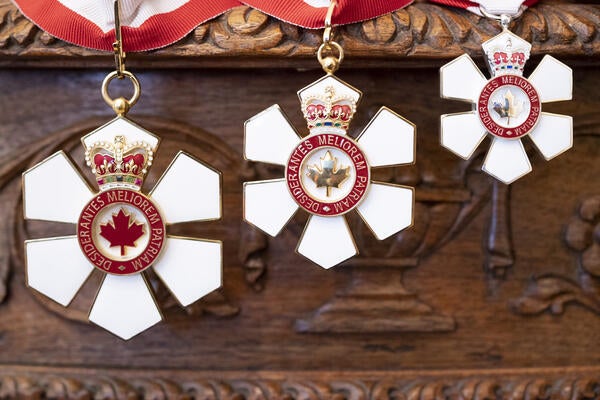
Waterloo celebrates Alice Munro
Short story writer Alice Munro becomes first Canadian to win Nobel Prize for literature. "She is the recognized international master of the short story."

Short story writer Alice Munro becomes first Canadian to win Nobel Prize for literature. "She is the recognized international master of the short story."
By Staff Communications and Public AffairsThe University of Waterloo is celebrating the news that Canadian writer Alice Munro has been awarded the Nobel Prize for Literature. Munro's fiction "forever changed how generations of readers look at place," says Shelley Hulan, associate professor of English Language and Literature.

Award-winning author Alice Munro.
Photo credit: Derek Shapton, courtesy of Random House Canada.
"To this day, I always read her stories where I can look out over one of the landscapes - southwestern Ontario's - that it celebrates," says Hulan.
"But it's not the topography that lingers in the mind. It's the way in which Munro has, for fifty years, made local places - in 'Sowesto,' across Canada, around the world - and the people in them, the inexhaustible sources of new revelation. This is a joyous day for Canadians and Munro readers everywhere."
Alice Munro, 82, is the author of 14 books of short stories. Earlier this year, she announced that her most recent book, Dear Life, would be her final book. Munro won the Governor General’s Award in 1968 for her first collection of short stories, Dance of the Happy Shades. It was the first in a long line of awards for the prolific author.
"What an achievement," said Feridun Hamdullahpur, president and vice-chancellor of the University of Waterloo. "The University of Waterloo joins her friends and family in celebrating her exemplary career."
Linda Warley, an associate professor of English Language and Literature, says the Nobel Prize is a timely and well-deserved mark of recognition for the Canadian author. “Munro’s work proves that a writer doesn’t have to write novels in order to be considered a serious writer; she is the recognized international master of the short story. She has pushed that genre in ways that no one else has.”

Insignia for Companion, Officer and Member of the Order of Canada. (Photo credit: Sgt Johanie Maheu, Rideau Hall © OSGG, 2019.)
Read more
Alumni and honorary alumni recognized for shaping Canada’s health, policy, justice and financial sectors

Read more
Meet five exceptional Waterloo graduate students crossing the convocation stage as Class of 2025 valedictorians

Read more
Twenty-six researchers receive federal funding to drive discovery, innovation and research infrastructure development
The University of Waterloo acknowledges that much of our work takes place on the traditional territory of the Neutral, Anishinaabeg, and Haudenosaunee peoples. Our main campus is situated on the Haldimand Tract, the land granted to the Six Nations that includes six miles on each side of the Grand River. Our active work toward reconciliation takes place across our campuses through research, learning, teaching, and community building, and is co-ordinated within the Office of Indigenous Relations.